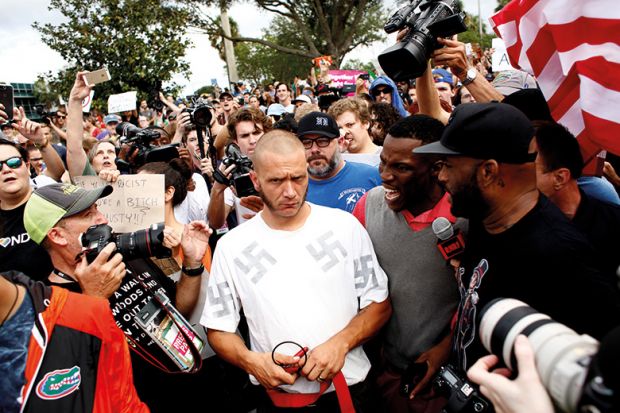Scores of masked individuals deliberately setting fires and throwing fireworks in the grounds of the University of California, Berkeley in protest against a planned speech by far-right commentator Milo Yiannopoulos. A Princeton University professor receiving death threats and going into hiding after videos of a commencement speech in which she criticised Donald Trump went viral. A Middlebury College faculty member suffering a neck injury and concussion after violence erupted at a talk by the controversial social scientist Charles Murray while she attempted to moderate.
Infringements of free speech on US university campuses are now being catalogued as part of a project from researchers at Georgetown University that aims to assess the condition of free speech in American higher education, civil society and state and local government.
So far 62 incidents, in which free speech has been challenged or compromised during or since 2016, are listed on the publicly available Free Speech Tracker. The majority of these took place on university campuses.
The project will also host public forums and interviews to collect views about the struggle to sustain First Amendment values.
Sanford J. Ungar, a journalist and former president of Goucher College in Baltimore, Maryland, is director of the initiative.
He said that the tracker already highlights an interesting trend: the same “lightning rods” are involved in many of the events.
“It is as though copycat crimes – copycat invasions of the First Amendment – are taking place around the country. I’m hoping that we’ll all be able to learn lessons from those and figure out what we have to do to prevent this from getting out of hand,” he told Times Higher Education.
Two such prominent lightning rods are Mr Yiannopoulos and Richard Spencer, president of white supremacist thinktank the National Policy Institute and one of the featured speakers at the Unite the Right rally in Charlottesville, Virginia earlier this year that resulted in the killing of a protester opposing the far Right.
Mr Ungar said that part of the tracker’s value was to put instances involving such figures on campuses in a wider context so that people could see that free speech challenges are “a truly national phenomenon”.
“People always say that the reason that university students have to confront these issues is that they have to be ready to participate in civil society, they have to act like grown-ups. You look at what’s going on in civil society, as reflected by the tracker, and the grown-ups aren’t doing so well,” he said.
“People on the floor of the Texas legislature with pistols in their pockets instead of settling disputes in an amicable grown-up way are threatening to kill each other,” he added of an incident in May.
When asked how well universities were handling free speech controversies, Mr Ungar was less than optimistic. “I think there’s a lot of clumsiness and difficulty in how to handle this,” he said.
But he added that the circumstances on campuses were often much more complicated than they were viewed or portrayed by the public and the media.
“I’m a real believer in free speech. But there are circumstances where it just isn’t that simple and other factors have to be taken into account,” Mr Ungar said.
“University communities, especially ones that are residential, have a real problem at the moment with their struggle to be inclusive…to make everyone feel not only welcome but safe in those communities.
“There are members of minority groups who feel genuinely threatened and are worried about what effect a talk by, say, Richard Spencer might have on their day-to-day lives.”
Mr Ungar is also concerned by increasing efforts by state legislatures to control campus protests and to dictate how universities must respond to such incidents by introducing statutes, “many of them surely unconstitutional under our system”.
“You have some state legislature saying that once a speaker has been invited, he or she cannot be disinvited. That’s a rather unusual interference in the affairs of a university,” Mr Ungar said.
One of the project’s goals is to suggest new frameworks for universities to “enhance the prospects for lucid and open conversation in the public sphere about the great issues of our time”.
Although this work is still in its early stages, Mr Ungar cited the University of Florida’s response last month to Mr Spencer, who invited himself to speak at the institution, as an effective approach.
“He spoke to a rather small audience, he was disrupted, no one was injured,” he said. The university spent an estimated $600,000 (£458,000) on security for the event.
“I hope that my project will, in due course, have some concrete suggestions or proposals about how to organise our future dealings with free speech so as to calm things down a bit,” he added.
POSTSCRIPT:
Print headline: The vocal measures of campus openness
Register to continue
Why register?
- Registration is free and only takes a moment
- Once registered, you can read 3 articles a month
- Sign up for our newsletter
Subscribe
Or subscribe for unlimited access to:
- Unlimited access to news, views, insights & reviews
- Digital editions
- Digital access to THE’s university and college rankings analysis
Already registered or a current subscriber? Login








